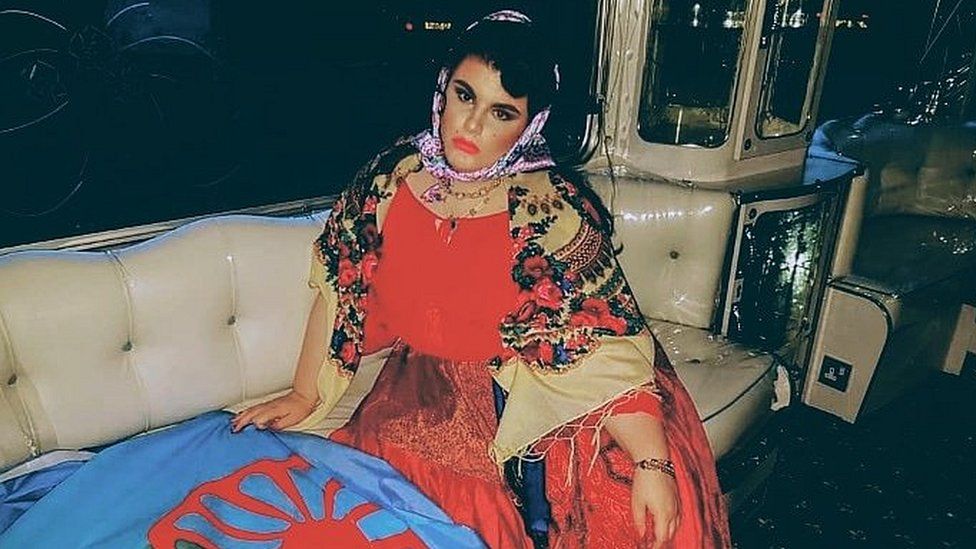Roma Traveller's abuse 'affecting university studies'
- Published

"I went out [one evening] in Chester and a man approached me. He told me I was 70% animal and only 30% human."
Lois Brookes-Jones talked frankly to BBC podcast The Next Episode about a man verbally abusing her with racial slurs on an evening out before following her home.
She said it was not the first time she had experienced abuse since starting university.
The 21-year-old is currently studying politics at the University of Chester.
She is also a Roma Traveller and the first person in her family to access higher education.
'Severely under-represented'
For most young people, the idea of applying to university can be overwhelming.
From choosing the right place to study to writing your personal statement, it's not always easy to navigate your way through your application without the support of teachers and family.
It's even more difficult when, as with Lois's parents, your family has never set foot inside a university before, never mind heard of admissions service Ucas.
"For my family, it was really important because it was something that they'd never have access to," said Lois.
"If your family can't read or write, how are you going to do the Ucas forms? Who is there to support you?"
Despite the hurdles, Lois got her place at university. Yet this was only half the struggle.
According to Ucas data, only 70 students identifying as Gypsy, Roma or Traveller (GRT) were accepted into UK universities out of more than 350,000 students who moved into higher education last year.
"Gypsy, Roma and Traveller people are severely under-represented in higher education," Chris Millward, director for fair access and participation at the Office for Students (OfS) said.
"A student's potential should never be restricted by ethnicity or background," he said.
"At the OfS, the Gypsy, Roma and Traveller community has been identified as a priority group. Universities are increasingly developing relationships with GRT people through their outreach work and we are supporting them to work together."
Mental-health impact
Although Lois believes there needs to be more support for Gypsy, Roma and Traveller students in applying for university, her biggest issue has been dealing with abuse aimed towards her throughout her two years of studies.
She says the abuse has had an impact on her mental health and made the past year difficult.
"I've had a lot of problems, both on campus and off campus. It's mainly because I tend to wear very traditional clothes all the time." she said.
Lois is proud of her heritage, expressing this in her fashion choices. She often wears a T-shirt with the slogan "Proud Gypsy" across the front.
"We had an external partner on campus and I simply went to find out about the swim timetables one evening." Lois said.
"There was a group of students that decided to clap in my face and shouted Zigan (A racial slur against Roma people) at me."
Lois says she's been to see the hate-crime officer at the University of Chester five times since she started, but they've never been available to speak to her.
A University of Chester spokesperson said: "While it would be inappropriate to comment about individual cases, the wellbeing of our students is extremely important to the University of Chester.
"The university takes hate crime - and any allegation of it - extremely seriously. We operate a multi-agency approach, with partners including Chester Students' Union; Cheshire West and Chester Council; and Cheshire Constabulary."
'Rom Belong'
With acceptances of Gypsy, Roma and Traveller students into higher education down by 26% from last year, The Next Episode decided to investigate outreach programmes available at the top 50 universities across the UK.
The investigation found 65% did not have support specifically for students from this group for applying to and attending the university.
However, some universities are already making changes.
King's College, London has set up the "Rom Belong" programme as part of its "widening participation" department, which aims to increase the representation of Gypsy, Roma and Traveller students in higher education.
Christine Browne is the Gypsy, Roma and Traveller student lead for the programme, and identifies as a Traveller. Her work includes contacting members of the GRT community to support them and educating non-Travellers.
"Widening-participation departments, which is where I work, have the opportunity and have it within their remit to do more schemes, and a lot of universities are - and they're starting to," she said.
"Before we started the work at King's, we approached universities who had done it in the past and have been engaging [with] their local communities for years."
"Since then we've been approached by lots of other universities that want to do more, so I feel like we're in the middle of a really exciting time, and it's being led by people who have gone through it."
Christine admits there's not enough outreach schemes yet, but it's changing.
"Universities are committed to helping all under-represented and disadvantaged students access education and ensure that all students are supported," said Universities UK.
"Progress is being made, with 18-year-olds from the most disadvantaged areas in England more likely to go to university than ever before.
"However, we know there is more work to do, including... improving access to higher education for GRT students."
Listen to the podcast from The Next Episode here.
- Published5 April 2019
- Published12 September 2018
- Published3 April 2019
- Published3 July 2018
- Published3 September 2017